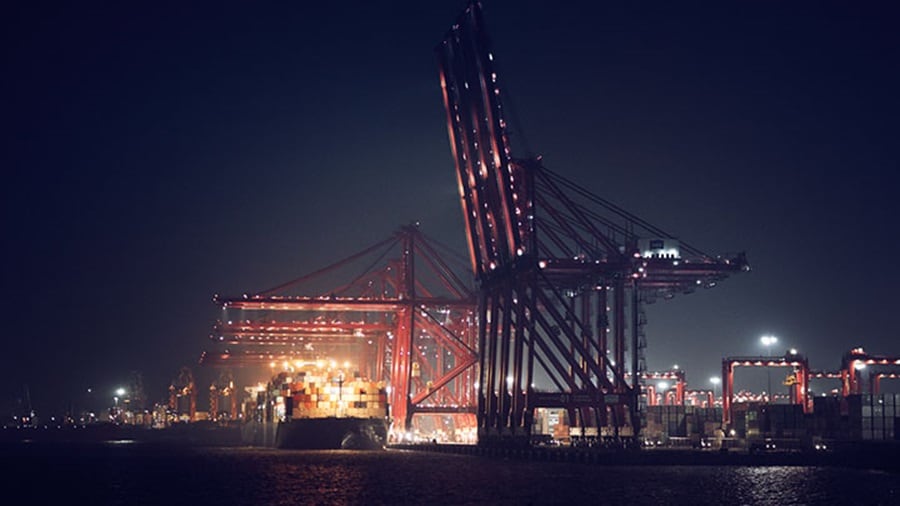Even after more than three years since its implementation, it’s safe to say the reality of Brexit and its consequences are still feeling a little tough to comprehend.
The United Kingdom’s withdrawal from the European Union in 2020 brought about a number of complexities for businesses at the border, including new procedures, increased costs and compliance issues that all put additional pressure on supply chains.
The numbers speak for themselves, too. According to the Environmental Systems Research Institute (ESRI), the volume of products traded between the EU and the UK has decreased by one-fifth as a result of Brexit, while Four Kites analysis shows that 38% of road cargo crossing the Schengen border (encompassing the majority of EU countries) experienced delays.
Uncertainty of Brexit keeps affecting supply chain
Let's take a closer look at the latest trade developments in the UK, where the situation is far from "business as usual".

In April 2023, the UK and the EU signed the Protocol on Ireland and Northern Ireland agreement, with the goal to prevent the emergence of a hard border between the EU member state of Ireland and UK country Northern Ireland. This included the establishment of a "green corridor" to facilitate the export of goods from Great Britain to Northern Ireland (known as the Windsor Framework), which eliminates customs requirements for food and medicine. Furthermore, it gave the British Government authority to now set VAT for businesses in Northern Ireland moving forwards, having previously adhered to EU rules.
In the medium term, the potential for improved relations between the EU and the UK, coupled with reduced trade dispute risks, holds the promise of a positive impact on economic growth.
Still, it will take time before these measures show tangible results. Likewise, the long-term implications of these decisions can’t yet be analysed, which once again contributes to the uncertainty of Brexit.
One notable change brought about by the Windsor Framework is the labelling of products as "not for the EU", which according to the EU Commission is to safeguard the EU single market by informing consumers that these retail goods are specifically for sale to consumers in Northern Ireland.
This requirement has significant implications for retailers as they will be required to label food products that cannot be shipped to the EU – and not just in terms of individual packages, but also the shipping crates and supermarket shelves where these products are displayed.
So political decisions around Brexit are still affecting businesses despite it being three years down the line, making it harder for them to establish a well-prepared framework for trade to and from the UK.
Day-to-day Brexit impact
Companies who handle business in or via the UK are incurring significantly higher costs for administration, logistics, customs, financing and IT adjustments in the name of uncertainty at borders. Meanwhile healthcare, transportation, hospitality and agriculture sectors are expressing concerns at stricter immigration rules resulting in a reduced workforce.
One such example of Brexit enhancing an already challenging situation is the ongoing truck driver shortage across Europe, with a reported 76,000 drivers currently ‘missing’ according to Logistics UK. The remaining drivers themselves also have a high average age, making short-term solutions difficult and somewhat impractical in the long run. The supply chain is in dire need of new drivers, but the barriers for workers from mainland Europe to move to the UK for work is hindering the growth of new recruits.

Since Brexit has led to stricter trade regulations for the import of perishable goods from the EU to the UK, Morocco has emerged as a promising alternative source of fruits and vegetables thanks to a direct shipping route that bypasses the EU. The Government's international trade data shows that the UK imported 403.7 million Great British Pounds (GBP) worth of fruits and vegetables from Morocco in 2022, a significant increase of 166% from 157.7 million GBP in 2019.
The trade arrangement between the African country and the UK has garnered strong support from a political perspective as well. The UK Court of Appeal's recent decision to dismiss a challenge to Morocco's strengthened position has eliminated any potential risks that could have disrupted the import of Moroccan goods.
Consequently, the connection with Morocco holds significant potential for British retailers. Regarding customs regulations, such imports to the UK require a Certificate of Conformity (CoC).
Aside from fruits and vegetables, cheese and meat imports to the UK are currently facing challenges due to newly introduced border controls that require veterinary approval for all imports of "medium risk" foods. The UK Government aimed to minimise burdens with these controls by reducing the need for physical checks on many types of goods, however the industry expects potential barriers in importing certain goods that will lead to supply disruptions and higher prices.
Meanwhile, courier services have faced difficulties in meeting new customs requirements. Traffic disruptions particularly for shipments from the UK to Ireland, new customs duties, documentation changes, bureaucratic procedures and the need for additional customs inspections have all contributed to delivery delays.
How to mitigate the impact of Brexit
Ivalua's survey shows that 8 out of 10 companies identified Brexit as the "biggest supply chain disruption" of the past 12 months, emphasising just how much complexity it’s brought to the average business. Nevertheless, the UK remains a crucial part of the European logistics puzzle, heralding the need for urgent and timely solutions to maintain resilient and flexible supply chains.
Given that Brexit has a significant impact on customs clearance, businesses must consider multiple factors and crucially need to provide the required information for all imported or exported goods. Customs taxes and non-tariff trade restrictions were reinstalled as of 2021 after the UK left the single market and customs union, which means goods from the UK are no longer considered of EU origin.
The example of fruits and vegetable imports from Morocco shows how increased border controls have resulted in heightened bureaucracy and delays. Double customs clearance is now essential for businesses supplying the UK market from the EU, and vice versa, to avoid excessive duties. Businesses must also question whether the necessary clearances are in compliance with new political decisions, such as the Windsor Framework.
With political interventions likely to continue, it is essential to address customer concerns regarding visibility, accuracy, and fluctuating costs. Operating compliantly has never been so essential, and unfortunately with customs-related matters, non-compliance can go undetected. We are urging our clients to ensure they are audit-ready at all times as customs authorities are particularly active.
Initiatives such as these can help to mitigate the impact of Brexit regulations:
- Bonded warehouses or exemptions from returns can help to minimise risks.
- Freeports present another opportunity for UK companies. These designated areas, often located near ports or airports, exempt goods from customs duty and VAT until they are brought to market from a freeport.
- Regarding Delivery Duty Paid (DDP) terms, it is crucial to note that the seller is responsible for customs clearance at the destination. This entails certain liabilities and risks that should be avoided. Having a European network that covers both sides of the English Channel can be immensely helpful to minimise complexity for companies.
- With forthcoming political interventions such as the latest updates to the Northern Ireland Protocol, it is essential to address customer concerns regarding visibility, compliance, and fluctuating costs. Centralising customs processing, particularly in digital form, can ensure transparent compliance and facilitate the smoothest possible flow of goods.
As a company, it is crucial to stay informed and prepared for the logistics impact posed by Brexit. With a well-established framework encompassing potential solutions for customs issues and ensuring a seamless flow of the supply chain, the groundwork has been laid to effectively handle the ongoing challenges.
未来,您想随时了解必读行业趋势吗?
您已经完成了,欢迎“登船”!
很抱歉,发送您的联系请求时出现问题。
请查看表单字段,确保所有已正确填写所有必填信息。如果问题仍然存在,请联系我们的支持团队以获得进一步的帮助。
未来,您想随时了解必读行业趋势吗?
使用此表格注册,即可直接在您的邮箱中接收我们的洞察见解,进入一个真正的综合物流世界。简单操作,即从我们为您量身定做的精选文章中获得启发,了解相关行业洞察信息。您可以随时取消订阅。













